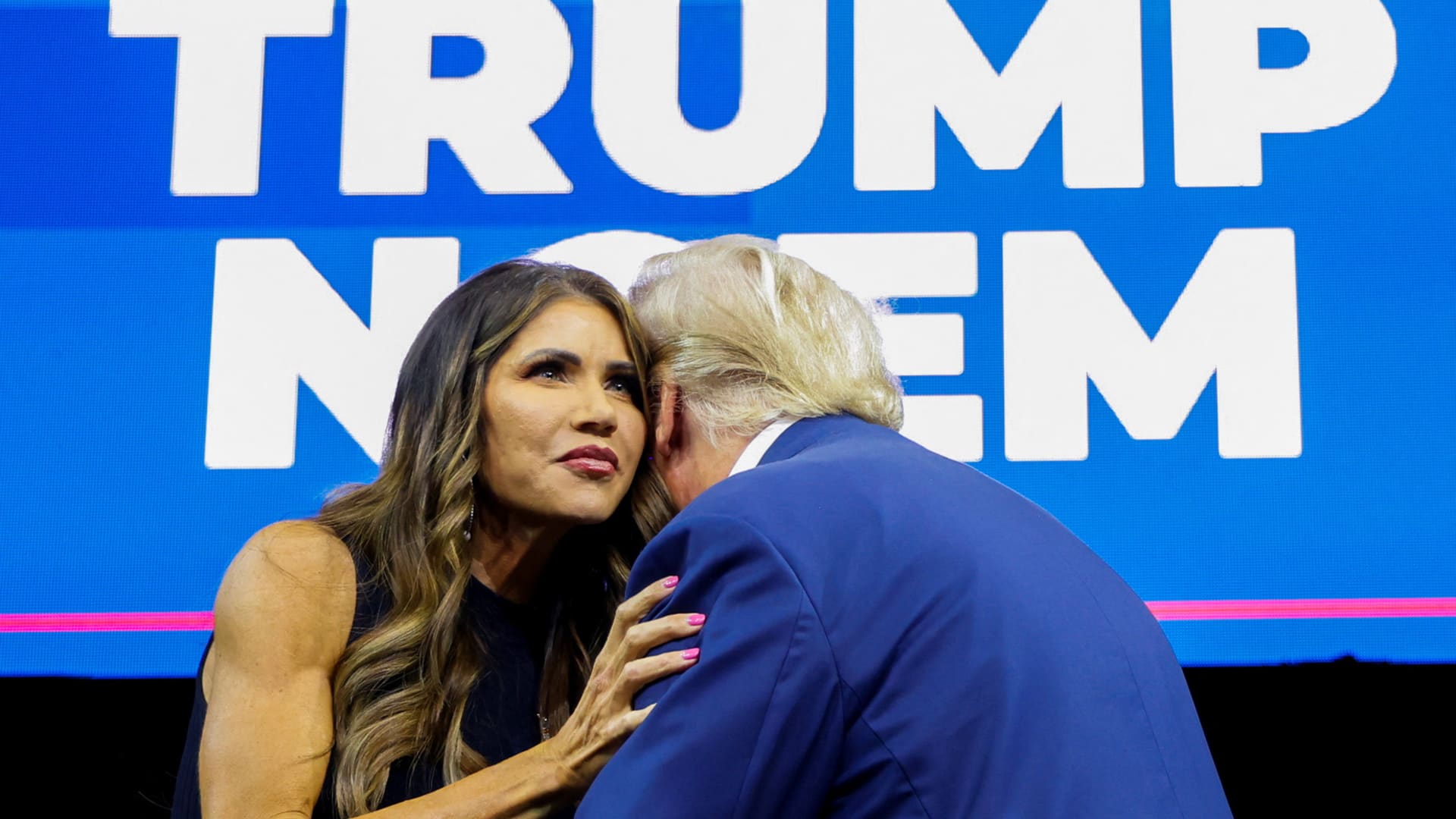When Rep. Marjorie Taylor Greene, Republican of Georgia, stood on the House floor this month and announced her proposal to censure the only Somali-born member of Congress, she said she was seeking punishment for “Rep. Ilhan Omar of Somalia — I mean Minnesota”. ”
Earlier that same week, Republican Troy Nehls of Texas called the Black husband of another Democratic woman of color, Rep. Cori Bush of Missouri, a “thug.” He then said that Mrs. Bush, who is also black, had received so many death threats because she was “so loud all the time.”
At a hearing at the Capitol, Senator Tom Cotton, Republican of Arkansas, questioned TikTok CEO Shou Chew about his country of origin. Mr Cotton repeatedly wanted to know whether Mr Chew, who is from Singapore and of Chinese descent, was Chinese, held a Chinese passport or was a member of the Chinese Communist Party.
“No, Senator – again, I’m Singaporean,” Mr Chew replied excitedly, after saying several times that he was not Chinese.
Around the same time, House Republicans released their impeachment report against Alejandro N. Mayorkas, the Cuban-born Homeland Security secretary who is the first Latino to lead his department. In unusually loaded language for a committee report, the panel described its actions as “expelling Secretary Mayorkas from office.”
In private the language was uglier. During a closed session of House Republicans, Rep. Mark E. Green, Republican of Tennessee and the panel’s chairman, called Mr. Mayorkas “a reptile without guts” for refusing to resign from office, according to Politico. A White House official condemned the statement, noting that Mr. Mayorkas is Jewish and that the comment reflected an anti-Semitic phrase.
And all within a week.
The racist discourse of Republican members of Congress, both in casual comments and official statements, has become so commonplace that it now often goes unnoticed without Republicans actually condemning them. Democrats often demand apologies but no longer expect a response, and these futile denunciations quickly disappear into a swamp of polarized content on social media.
The pattern is emerging as the Republican Party once again coalesces behind former President Donald J. Trump, who routinely made bigoted statements during his first campaign for the White House and his presidency. His approach has encouraged some Republicans to freely use rhetoric that denigrates people based on their ethnicity, religion or nationality.
“The nature of Trumpism is to encourage extremism,” said Rep. Ritchie Torres, a Black Democrat from New York. “Whether it’s harassing an Asian witness because of his ethnic loyalties, dehumanizing a Cabinet secretary, accusing a Muslim woman of treason or calling a black man a criminal, Republican members of Congress are crossing lines that should never be crossed.”
Mr Torres said the sad reality was that “the extreme elements have come to the conclusion that racism may be bad morals, but it is good politics.”
“Instead of representing the best about America,” he said, “Congress increasingly represents the worst.”
When Republicans on Capitol Hill have similar concerns, they rarely voice them publicly. Speaker Mike Johnson’s office had no comment on the recent incidents.
The Republican Party, which has relied primarily on white voters for decades, has long exploited fear and prejudice to energize its base, be it Barry Goldwater’s vocal opposition to the Civil Rights Act of 1964 or George H. W. Bush’s use of the black convict Willie Horton in a 1988 presidential ad.
Mr. Trump reinforced that strategy by entering the national political conversation by spreading the racist lie that President Barack Obama, the nation’s first black president, was not born in the United States.
As president, Mr. Trump regularly made racist remarks that went beyond the dog whistle, calling African nations “shithole countries,” saying there were “very good people on both sides” of a white supremacist rally in Charlottesville, Virginia, and recounting it The four Democratic congressmen of color called themselves “The Squad” to go back to where they came from. (Of the four, only Ms. Omar was born outside the United States.)
Mr. Trump recently referred to Nikki Haley, a rival for the Republican nomination who is the daughter of Indian immigrants, as “Nimrada,” misspelling her first name, Nimarata. He also amplified social media posts falsely claiming she was not born in the United States.
A spokesman for Mr. Trump’s campaign, Steve Cheung, made no apology for Mr. Trump’s language, saying: “President Trump is a truth teller, and the more people follow his lead and speak out, the better.”
The racist comments resonate widely with Mr. Trump’s political coalition, which is 85 percent white, in a country where 59 percent are white and the proportion is shrinking by the day. Republicans in Congress have also tried to capitalize on the grievances of their base.
Ms. Greene raised funds from her proposed rebuke of Ms. Omar, which was written based on a mistranslation of her remarks in Somali that went viral on right-wing social media, and she has fueled the cycle by amplifying hatred and misinformation on the Internet.
“Ilhan Omar embodies the greatest threat facing America: hordes of migrants invading our country with no real desire to assimilate or embrace what it means to be an American,” Ms. Greene wrote in a fundraising appeal to small donors. This language encompasses the basic tenets of a conspiracy theory known as replacement theory, which explains demographic change as a conspiracy by Western elites, including Jews, to replace and disempower white people.
Stuart P. Stevens, a former Republican strategist who has described the GOP as “a white grievance party,” blamed the recent spate of racist remarks squarely on Mr. Trump.
“You don’t have to argue that Trump has made people more racist, but I don’t think you can argue that he has given people permission to express their racist views,” Stevens said in an interview.
“There is someone running for the Republican presidential nomination who is making fun of his opponent’s race,” he said, referring to Mr. Trump’s misuse of Ms. Haley’s first name. “There is no element of the Republican Party that is punishing this.”
The Democrats’ condemnations appear to have only emboldened Republicans.
In her no-confidence vote, Ms. Greene accused Ms. Omar of making “treasonous statements” and acting as a foreign agent of the Somali government. She was responding to a video of Ms. Omar speaking in Somali that was circulating on right-wing social media accounts and falsely quoted her as saying she was “Somali first” and would dictate U.S. policy toward Somalia.
This translation has since been refuted by several independent news outlets. In fact, Ms. Omar’s comments were consistent with the government’s official position on Somalia.
“As long as I’m in Congress, no one will take Somalia’s sea,” she said. “And the United States will not support other people in robbing us.”
But that didn’t stop Ms. Greene from pushing forward with her measure citing the mistranslation. While some Republicans said they were unlikely to support it, Ms. Greene insisted she was “not repealing it, not backing down.”
Her actions prompted a denunciation from Rep. Jim McGovern, Democrat of Massachusetts, which sparked a feud on social media. After Ms. Greene mocked Mr. McGovern’s bathroom habits, he replied, “Aren’t you late for a Klan meeting?”
Democrats, meanwhile, said the “reptilian” comment about Mr. Mayorkas was evidence that the impeachment process itself was motivated by racism.
“Chairman Green’s comments are pure bigotry,” said Rep. Delia Ramirez, Democrat of Illinois. “This entire impeachment process was a bigoted, biased spectacle.”
Republicans have presented no evidence of high crimes and misdemeanors as they seek to impeach a Cabinet secretary for the first time since 1876. Instead, they have accused Mr. Mayorkas of deliberately encouraging an “invasion” of immigrants and plan to hold a second vote on his impeachment on Tuesday after their first attempt failed.
The AAPI Victory Fund, a political action committee supporting Asian American candidates, condemned Mr. Cotton’s questioning of Mr. Chew as “disgraceful, blatantly racist and deeply dangerous.” But the senator defended it in an interview with Fox News.
“It is entirely reasonable to question whether he himself, like his company, is subject to the influence of the Chinese Communist Party,” Mr Cotton said.
Rep. Hakeem Jeffries, Democrat of New York and minority leader, said Mr. Nehls’ “thug” comment was “shameful” and “clearly used racially inflammatory language.” He demanded an apology.
Nobody came.
Source link
2024-02-13 18:22:30
www.nytimes.com














